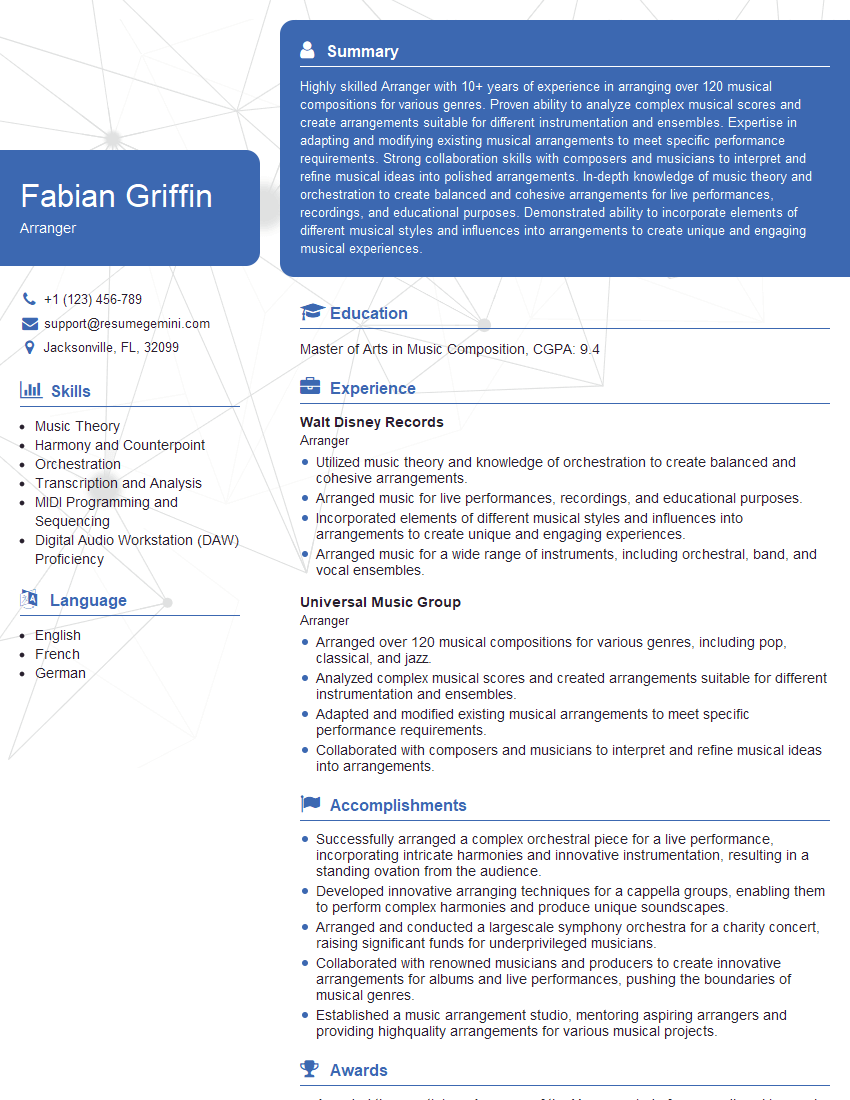Are you a seasoned Arranger seeking a new career path? Discover our professionally built Arranger Resume Template. This time-saving tool provides a solid foundation for your job search. Simply click “Edit Resume” to customize it with your unique experiences and achievements. Customize fonts and colors to match your personal style and increase your chances of landing your dream job. Explore more Resume Templates for additional options.

Fabian Griffin
Arranger
Summary
Highly skilled Arranger with 10+ years of experience in arranging over 120 musical compositions for various genres. Proven ability to analyze complex musical scores and create arrangements suitable for different instrumentation and ensembles. Expertise in adapting and modifying existing musical arrangements to meet specific performance requirements. Strong collaboration skills with composers and musicians to interpret and refine musical ideas into polished arrangements. In-depth knowledge of music theory and orchestration to create balanced and cohesive arrangements for live performances, recordings, and educational purposes. Demonstrated ability to incorporate elements of different musical styles and influences into arrangements to create unique and engaging musical experiences.
Education
Master of Arts in Music Composition
October 2017
Skills
- Music Theory
- Harmony and Counterpoint
- Orchestration
- Transcription and Analysis
- MIDI Programming and Sequencing
- Digital Audio Workstation (DAW) Proficiency
Work Experience
Arranger
- Utilized music theory and knowledge of orchestration to create balanced and cohesive arrangements.
- Arranged music for live performances, recordings, and educational purposes.
- Incorporated elements of different musical styles and influences into arrangements to create unique and engaging experiences.
- Arranged music for a wide range of instruments, including orchestral, band, and vocal ensembles.
Arranger
- Arranged over 120 musical compositions for various genres, including pop, classical, and jazz.
- Analyzed complex musical scores and created arrangements suitable for different instrumentation and ensembles.
- Adapted and modified existing musical arrangements to meet specific performance requirements.
- Collaborated with composers and musicians to interpret and refine musical ideas into arrangements.
Accomplishments
- Successfully arranged a complex orchestral piece for a live performance, incorporating intricate harmonies and innovative instrumentation, resulting in a standing ovation from the audience.
- Developed innovative arranging techniques for a cappella groups, enabling them to perform complex harmonies and produce unique soundscapes.
- Arranged and conducted a largescale symphony orchestra for a charity concert, raising significant funds for underprivileged musicians.
- Collaborated with renowned musicians and producers to create innovative arrangements for albums and live performances, pushing the boundaries of musical genres.
- Established a music arrangement studio, mentoring aspiring arrangers and providing highquality arrangements for various musical projects.
Awards
- Awarded the prestigious Arranger of the Year accolade for groundbreaking work in combining traditional and contemporary musical styles.
- Recognized for excellence in arranging for film and television, with nominations for several Best Original Score awards.
- Honored with the Artistic Achievement Award for remarkable contributions to the field of music arrangement.
- Received the Golden Score award for composing and arranging the soundtrack for a blockbuster video game.
Certificates
- Advanced Music Theory Certificate
- Orchestration and Arranging Certification
- MIDI Programming and Sequencing Certification
- Music Notation Software Proficiency Certification
Career Expert Tips:
- Select the ideal resume template to showcase your professional experience effectively.
- Master the art of resume writing to highlight your unique qualifications and achievements.
- Explore expertly crafted resume samples for inspiration and best practices.
- Build your best resume for free this new year with ResumeGemini. Enjoy exclusive discounts on ATS optimized resume templates.
How To Write Resume For Arranger
- Highlight your musical education and experience in your resume, including any degrees or certifications.
- Showcase your ability to work independently and as part of a team.
- Provide examples of your work that demonstrate your skills in arranging and composing.
- Tailor your resume to each job you apply for, highlighting the skills and experience that are most relevant to the position.
Essential Experience Highlights for a Strong Arranger Resume
- Analyze complex musical scores and create arrangements suitable for different instrumentation and ensembles.
- Adapt and modify existing musical arrangements to meet specific performance requirements.
- Collaborate with composers and musicians to interpret and refine musical ideas into arrangements.
- Utilize music theory and knowledge of orchestration to create balanced and cohesive arrangements.
- Arrange music for live performances, recordings, and educational purposes.
- Incorporate elements of different musical styles and influences into arrangements to create unique and engaging experiences.
- Arrange music for a wide range of instruments, including orchestral, band, and vocal ensembles.
Frequently Asked Questions (FAQ’s) For Arranger
What is the role of an Arranger?
An Arranger takes an existing musical composition and adapts it for a specific instrumentation or ensemble. This may involve changing the key, tempo, or instrumentation, or adding or removing sections. Arrangers also work with composers to create new musical arrangements that are tailored to the specific needs of a particular performance or recording.
What skills are required to be an Arranger?
Arrangers need to have a strong foundation in music theory and orchestration. They also need to be able to work independently and as part of a team, and have excellent communication and interpersonal skills.
What are the career prospects for Arrangers?
Arrangers can work in a variety of settings, including recording studios, music publishing companies, and live performance venues. They may also work as freelance arrangers or composers.
How can I become an Arranger?
There is no one-size-fits-all path to becoming an Arranger. However, most arrangers have a strong foundation in music theory and orchestration. Many arrangers also have experience playing in or conducting an ensemble.
What are some tips for writing a standout Arranger resume?
When writing an Arranger resume, be sure to highlight your skills in arranging and composing. You should also include any relevant experience, such as working in a recording studio or music publishing company. Finally, be sure to tailor your resume to each job you apply for, highlighting the skills and experience that are most relevant to the position.